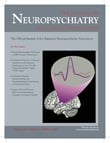SIR: Literature regarding neurologically-induced obsessive-compulsive disorder is sparse as far as treatment and outcome are concerned, probably because of associated poor prognostication of neurological conditions. We wish to report a case of obsessive-compulsive disorder with hydrocephalus that showed remarkable improvement following a ventriculo-peritoneal shunt.
Case Report
“Mr. R,” a 29-year-old man, presented with four attacks of generalized tonic-clonic seizures, for which he was put on a regimen of phenytoin, 300mg/day for 3 years. During this period, he did not experience any seizures. About 2 years into the treatment, the patient developed obsessive-compulsive disorder in the form of repetitively checking locks, touching and feeling the entire lock with his fingers, and only then finally locking it. He would experience repetitive distressing thoughts of checking and touching the locks and would feel relieved only when he performed the entire act, despite realizing its irrationality. He would try to resist but would not be able to achieve complete control over his symptoms. Overall, total time spent in the obsessions and the compulsions would be around 1.5 hours a day.
Over the following 3 months, the time spent on the obsessions and compulsions increased to greater than 3 and up to 8 hours per day. His symptoms were severe in degree based on the Yale-Brown Obsessive-Compulsive Scale.
1 For this he was treated with a regimen of fluoxetine, 60mg/day, and clomipramine, 200mg/day, and sessions of behavior therapy, but without any improvement. Five months after he stopped taking phenytoin, he had another attack of generalized tonic-clonic seizures and severe headaches; hence, the phenytoin regimen recommenced.
A magnetic resonance imaging (MRI) brain scan demonstrated hydrocephalus with marked dilatation of the frontal horns bilaterally. Intracranial pressure monitoring showed peaks of raised intracranial pressures. Cerebrospinal fluid drainage by a ventriculo-peritoneal shunt was provided. After shunting, he showed remarkable improvement in his obsessive-compulsive symptoms. His compulsions disappeared, as did his obsessional thoughts. Subsequently, the patient maintained well without any anti-obsessional drugs.
Comment
To the best of our knowledge, this appears to be the first case report in which obsessive-compulsive symptoms were associated with the hydrocephalus with marked dilatation of frontal horns. Furthermore, after ventriculo-peritoneal shunt, significant improvement was noticed in his obsessive-compulsive symptoms, which had earlier shown no response to pharmacological and behavior therapy. Several recent studies of functional neuroimaging revealed that obsessive-compulsive patients have an increased metabolic activity in the orbitofrontal cortex.
2 Further, it is also observed that there is a normalization of the metabolic activity in these regions after treatment with drugs or behavior therapy among responsive patients.
2 Although psychiatric manifestation related to hydrocephalus is reported,
3 the role of hydrocephalus in the emergence of obsessive-compulsive symptoms has not been well documented. Only one report described a case in which the obsessive-compulsive symptoms were associated with normal pressure hydrocephalus and the patient showed marked improvement following the ventriculo-peritoneal shunt.
4 Emergence of obsessive-compulsive symptoms in our case may be due to accumulation of metabolites, such as 5-HIAA and HVA, in the frontal horns and ventricles, and improvement of the symptoms after shunting may be due to the normalization in disposal of these metabolites.

